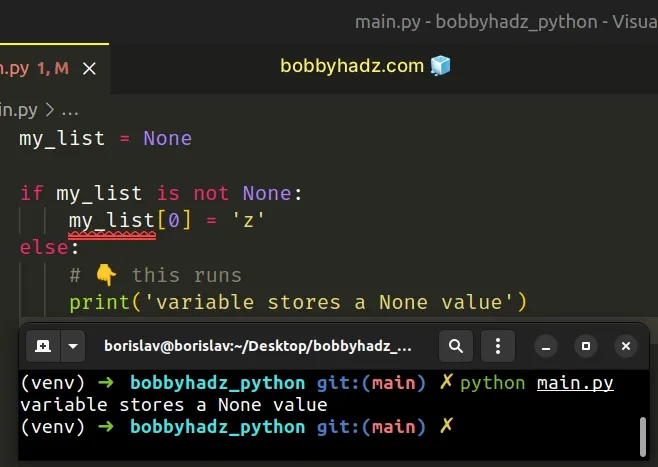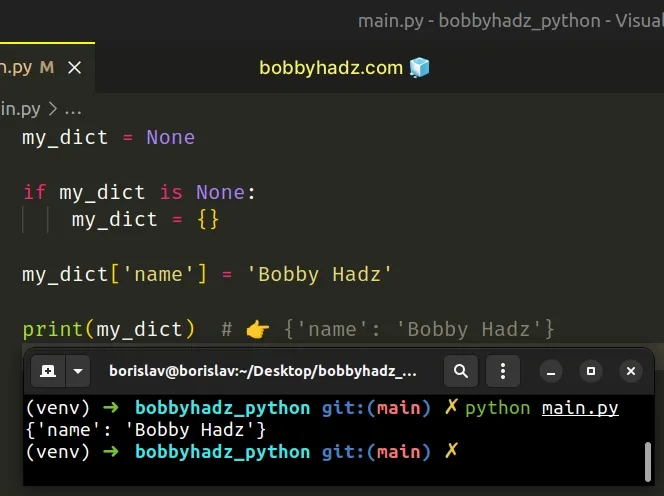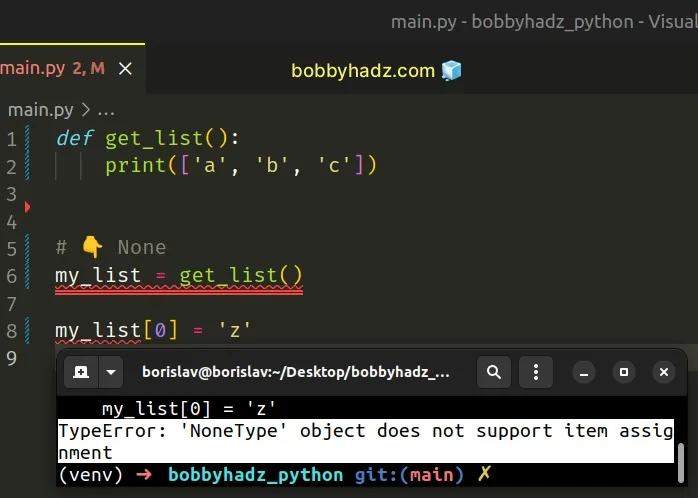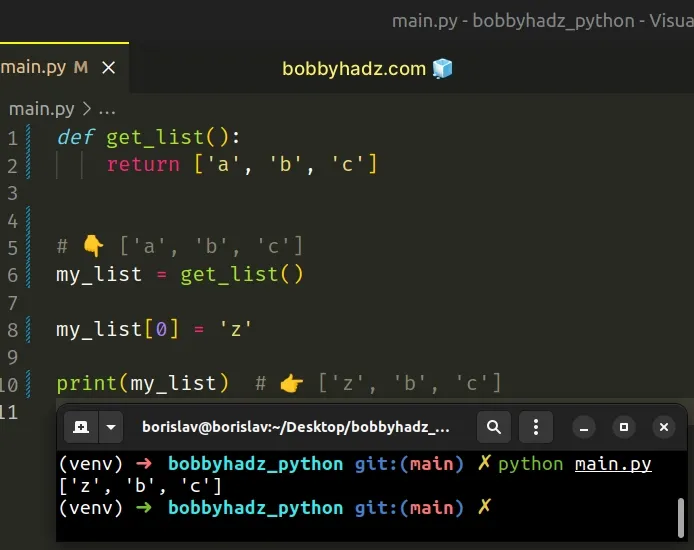TypeError: NoneType object does not support item assignment
Last updated: Apr 8, 2024
Reading time·3 min

# TypeError: NoneType object does not support item assignment
The Python "TypeError: NoneType object does not support item assignment"
occurs when we try to perform an item assignment on a None value.
To solve the error, figure out where the variable got assigned a None value
and correct the assignment.

Here is an example of how the error occurs.
my_list = None # ⛔️ TypeError: 'NoneType' object does not support item assignment my_list[0] = 'a'
We tried to assign a value to a variable that stores None.
# Checking if the variable doesn't store None
Use an if statement if you need to
check if a variable doesn't store a None value
before the assignment.
my_list = None if my_list is not None: my_list[0] = 'z' else: # 👇️ this runs print('variable stores a None value')

The if block is only run if the variable doesn't store a None value,
otherwise, the else block runs.
# Setting a fallback value if the variable stores None
Alternatively, you can set a fallback value if the variable stores None.
my_dict = None if my_dict is None: my_dict = {} my_dict['name'] = 'Bobby Hadz' print(my_dict) # 👉️ {'name': 'Bobby Hadz'}

If the variable stores a None value, we set it to an empty dictionary.
# Track down where the variable got assigned a None value
You have to figure out where the variable got assigned a None value in your
code and correct the assignment to a list or a dictionary.
The most common sources of None values are:
- Having a function that doesn't return anything (returns
Noneimplicitly). - Explicitly setting a variable to
None. - Assigning a variable to the result of calling a built-in function that doesn't return anything.
- Having a function that only returns a value if a certain condition is met.
# Functions that don't return a value return None
Functions that don't explicitly return a value return None.
# 👇️ This function returns None def get_list(): print(['a', 'b', 'c']) # 👇️ None my_list = get_list() # ⛔️ TypeError: 'NoneType' object does not support item assignment my_list[0] = 'z'

You can use the return statement to return a value from a function.
def get_list(): return ['a', 'b', 'c'] # 👇️ ['a', 'b', 'c'] my_list = get_list() my_list[0] = 'z' print(my_list) # 👉️ ['z', 'b', 'c']

The function now returns a list, so we can safely change the value of a list element using square brackets.
# Many built-in functions return None
Note that there are many built-in functions (e.g. sort()) that mutate the
original object in place and return None.
a_list = ['c', 'b', 'a'] result = a_list.sort() print(result) # 👉️ None # ⛔️ TypeError: 'NoneType' object does not support item assignment result[0] = 'Z'
The sort() method mutates the list in place and returns None, so we
shouldn't store the result of calling it into a variable.
To solve the error, remove the assignment.
a_list = ['c', 'b', 'a'] a_list.sort() a_list[0] = 'Z' print(a_list) # 👉️ ['Z', 'b', 'c']
# A function that returns a value only if a condition is met
Another common cause of the error is having a function that returns a value only if a condition is met.
def get_list(a): if len(a) > 3: return a # 👇️ None my_list = get_list(['a', 'b'])
The if statement in the get_list function is only run if the passed-in
argument has a length greater than 3.
None.To solve the error, you either have to check if the function didn't return
None or return a default value if the condition is not met.
def get_list(a): if len(a) > 3: return a return [] # 👈️ return an empty list if condition not met # 👇️ [] my_list = get_list(['a', 'b'])
Now the function is guaranteed to return a value regardless of whether the condition is met.
# Additional Resources
You can learn more about the related topics by checking out the following tutorials:
- How to Return a default value if None in Python
- Why does my function print None in Python [Solved]
- Check if a Variable is or is not None in Python
- Convert None to Empty string or an Integer in Python
- How to Convert JSON NULL values to None using Python
- Join multiple Strings with possibly None values in Python
- Why does list.reverse() return None in Python

